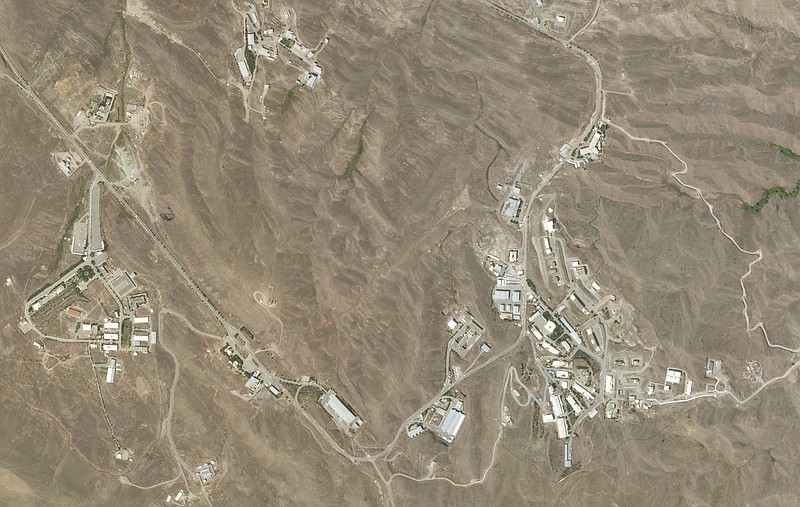DUBAI, United Arab Emirates -- An expiring United Nations weapons embargo on Iran must remain in place to prevent it from "becoming the arms dealer of choice for rogue regimes and terrorist organizations around the world," the U.S. special representative to Iran said Sunday.
Brian Hook told The Associated Press that the world should ignore Iran's threats to retaliate if the arms embargo set to expire in October is extended, calling it a "mafia tactic." Among its options, the Islamic Republic could expel international inspectors monitoring Iran's nuclear program, deepening a crisis stemming from President Donald Trump unilaterally withdrawing from Tehran's 2015 atomic accord with global powers.
The U.N. arms embargo so far has stopped Iran from purchasing fighter jets, tanks, warships and other weaponry, but has failed to halt its smuggling of weapons into war zones. Despite that, Hook argued that both an import and export ban on Tehran must remain to secure the wider Mideast.
"If we let it expire, you can be certain that what Iran has been doing in the dark, it will do in broad daylight and then some," Hook said.
Iran's mission to the United Nations did not immediately respond to a request for comment on Hook's remarks. However, President Hassan Rouhani described 2020 as Iran's "most difficult year" on Sunday because of the U.S. economic pressure campaign and the coronavirus pandemic.
Hook made the comments via videoconference while on a visit to Abu Dhabi, capital of the U.S.-allied United Arab Emirates, as part of a Mideast tour. He met Saturday with Emirati Foreign Minister Abdullah bin Zayed Al Nahyan.
The United Nations banned Iran from buying major foreign weapon systems in 2010 amid tensions over its nuclear program. That blocked it from replacing its aging equipment, much of which had been purchased by the shah before the 1979 Islamic Revolution. An earlier embargo targeted Iranian arms exports.
If the embargo were lifted, the U.S. Defense Intelligence Agency predicted in 2019 that Iran probably would try to purchase Russian Su-30 fighter jets, Yak-130 trainer aircraft and T-90 tanks. Tehran also might try to buy Russia's S-400 anti-aircraft missile system and its Bastian coastal defense missile system, the Defense Intelligence Agency said.
Iran has long been outmatched by U.S.-backed Gulf nations such as the UAE, which have purchased billions of dollars of advanced American weaponry. In response, Tehran turned toward developing ballistic missiles.
Being able to pay for new, foreign weapons systems, however, remains in question. U.S. sanctions imposed after Trump withdrew from the nuclear deal have crushed Iran's oil sales, a major source of revenue. Energy prices have also collapsed amid the pandemic.
Asked about how Iran would pay for new weapons, Hook said Tehran's lowered revenue represented "a good thing for the region" and affected its ability to back its regional proxies such as Syria.
"We have put this regime through our strategy on the horns of a dilemma," Hook said. "They have to choose between guns in Damascus or butter in Tehran."
That pressure has led to sporadic anti-government protests in Iran, including nationwide demonstrations in November that Amnesty International says saw more than 300 people killed. While the Trump administration has maintained it doesn't seek to overthrow Iran's government, its pressure campaign has exacerbated public anger against its Shiite theocracy.
Since Trump's withdrawal from the nuclear deal, Iran has broken all the accord's production limits. The U.N.'s International Atomic Energy Agency, which monitors Iranian nuclear activity as part of the deal, says Tehran's stockpile of low-enriched uranium continues to grow.
While not at weapons-grade levels, the growing stockpile and increased production shortens the one-year timeline analysts believe Iran would need to have enough material for a nuclear weapon if it chose to pursue one.
Iran has threatened to expel agency inspectors and withdraw from the Nuclear Nonproliferation Treaty amid the U.S. pressure campaign. North Korea, which now has nuclear weapons, is the only country to ever withdraw from the treaty.
"If we play by Iran's rules, Iran wins," Hook said. "It is a mafia tactic where people are intimidated into accepting a certain kind of behavior for fear of something far worse."



